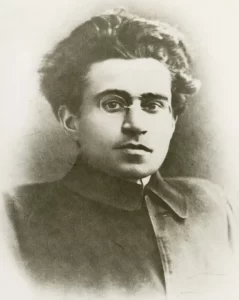
During his imprisonment by the fascist regime of Mussolini, Gramsci wrote extensively in his prison notebooks
SHOUKAT LOHAR
Antonio Gramsci was an influential Italian philosopher, political theorist, and Marxist revolutionary who lived from 1891 to 1937. His ideas have left a profound impact on the realms of philosophy and politics, providing new insights into the study of society, culture, and power dynamics. Despite facing adversity and imprisonment, Gramsci’s work continues to inspire scholars and activists worldwide.
Early Life and Political Activism
Antonio Gramsci was born in Sardinia, Italy, in a modest family. His early exposure to poverty and inequality deeply influenced his political beliefs. He became actively involved in socialist movements and joined the Italian Communist Party (PCI) in 1921. As the political landscape of Italy changed, he emerged as one of the key leaders of the party.
Concept of Hegemony
Gramsci’s most notable contribution to philosophy is the concept of hegemony. He argued that power relations in society are not solely based on force or coercion but also on consent. Hegemony refers to the dominance of a ruling class through the establishment of cultural, intellectual, and moral leadership over subordinate classes. This idea reshaped the understanding of how societies maintain and challenge power structures.
Prison diary or note books
During his imprisonment by the fascist regime of Mussolini, Gramsci wrote extensively in his prison notebooks. These writings formed the foundation of his philosophical and political theories. Within these notebooks, he explored issues like culture, education, intellectuals, and historical materialism, providing profound insights into the complexities of social change and revolutionary struggles.
Intellectuals and Organic Intellectuals
Gramsci developed the concept of intellectuals into a nuanced framework. He distinguished between traditional intellectuals, who served the interests of the ruling class, and organic intellectuals, who emerged from the working class and represented their interests. Gramsci emphasized the importance of organic intellectuals in leading transformative movements and challenging the dominant ideology.
Cultural Hegemony and Cultural Marxism
Gramsci’s concept of cultural hegemony laid the groundwork for the emergence of cultural Marxism. Cultural Marxism refers to the application of Marxist principles to cultural, artistic, and intellectual realms. Gramsci’s ideas have been influential in shaping critical theories, particularly in fields like media studies, literature, and cultural studies.
Legacy and Impact
After Gramsci’s death, his writings gained prominence, and his ideas spread across the globe. His theories have influenced various social movements and academic disciplines, including sociology, political science, and cultural studies. Scholars and activists continue to engage with his work to understand contemporary issues related to power, inequality, and social change.
Gramsci’s philosophy
Antonio Gramsci’s philosophy has left an indelible mark on the study of society and politics. His concepts of hegemony, intellectuals, and cultural Marxism continue to be relevant in contemporary discussions on power dynamics and social transformation. Despite facing imprisonment and adversity, Gramsci’s legacy lives on, inspiring generations to challenge existing power structures and strive for a more just and equitable society.
Antonio Gramsci’s “Prison Notebooks” and His Enduring Influence
 Antonio Gramsci, an Italian Marxist philosopher, and political theorist, was incarcerated by the Fascist regime from 1926 until his death in 1937. During his imprisonment, Gramsci penned his renowned “Prison Notebooks,” an intellectual masterpiece that has had a profound and lasting impact on various fields, including political theory, sociology, and cultural studies. This essay explores the significance of Gramsci’s “Prison Notebooks” and delves into the enduring influence they have had on subsequent generations of scholars and activists.
Antonio Gramsci, an Italian Marxist philosopher, and political theorist, was incarcerated by the Fascist regime from 1926 until his death in 1937. During his imprisonment, Gramsci penned his renowned “Prison Notebooks,” an intellectual masterpiece that has had a profound and lasting impact on various fields, including political theory, sociology, and cultural studies. This essay explores the significance of Gramsci’s “Prison Notebooks” and delves into the enduring influence they have had on subsequent generations of scholars and activists.
Section 1: Context and Composition of the “Prison Notebooks” Incarcerated in Mussolini’s Italy, Gramsci wrote his “Prison Notebooks” as a series of essays, reflections, and fragments on diverse topics such as politics, culture, ideology, hegemony, and intellectuals. Despite the harsh conditions of his imprisonment, Gramsci diligently recorded his thoughts in notebooks, creating a seminal work that has since become a foundational text for understanding the complexities of power, resistance, and social change.
Section 2: Gramsci’s Concepts and Theories One of the most significant contributions of Gramsci’s “Prison Notebooks” is his concept of cultural hegemony. He argued that dominant groups maintain their power not only through coercion but also by shaping the culture and values of society. This notion of hegemony has become pivotal in analyzing how ruling elites maintain control over the masses in contemporary societies.
 Gramsci also examined the role of intellectuals and their influence on society. He distinguished between traditional and organic intellectuals, emphasizing the potential for the latter to lead transformative movements. This idea has influenced studies on intellectual activism and the agency of intellectuals in societal change.
Gramsci also examined the role of intellectuals and their influence on society. He distinguished between traditional and organic intellectuals, emphasizing the potential for the latter to lead transformative movements. This idea has influenced studies on intellectual activism and the agency of intellectuals in societal change.
Section 3: Influence on Marxist Thought and Beyond The impact of Gramsci’s “Prison Notebooks” extends beyond Marxist circles. His emphasis on culture, ideology, and hegemony has influenced various intellectual traditions, including critical theory, cultural studies, and postcolonial studies. Scholars worldwide have engaged with his ideas to analyze the dynamics of power and resistance in different contexts.
Furthermore, Gramsci’s work has significantly shaped the field of cultural studies, which explores how cultural practices, representations, and discourses shape social relations. His analysis of popular culture and its role in shaping collective consciousness laid the groundwork for the examination of media, popular arts, and cultural production in contemporary societies.
Section 4: Political Impact and Activism Gramsci’s ideas have had a profound impact on political movements and activism. His notion of a “war of position,” where social change is achieved through cultural and ideological struggles, has inspired grassroots movements and political organizing. His emphasis on building counter-hegemonic alliances has informed the strategies of numerous social movements seeking social justice and transformative change.
Section 5: Legacy and Contemporary Relevance More than eight decades after Gramsci’s death, his “Prison Notebooks” remain a relevant and influential text. In an era of globalization, inequality, and resurgent authoritarianism, his concepts and theories continue to offer valuable insights into understanding contemporary social, political, and cultural challenges. The enduring relevance of Gramsci’s work lies in its ability to inspire critical thinking, resistance, and the pursuit of a more just and equitable world.
Conclusion
Antonio Gramsci’s “Prison Notebooks” are a testament to the power of intellectual inquiry and activism even in the most adverse circumstances. Through these notebooks, Gramsci illuminated the complexities of power, culture, and social change, leaving a profound and lasting impact on political theory, sociology, and cultural studies. His ideas have resonated with generations of scholars and activists, inspiring transformative movements and critical analyses that continue to shape contemporary struggles for justice and equality. Gramsci’s legacy is a testament to the enduring influence of ideas, even when they are penned behind prison walls.
_____________
 Shoukat Lohar is Assistant professor in English at Mehran University of Engineering and Technology Jamshoro. He can be reached at Shoukat.ali@faculty.muet.edu.pk
Shoukat Lohar is Assistant professor in English at Mehran University of Engineering and Technology Jamshoro. He can be reached at Shoukat.ali@faculty.muet.edu.pk